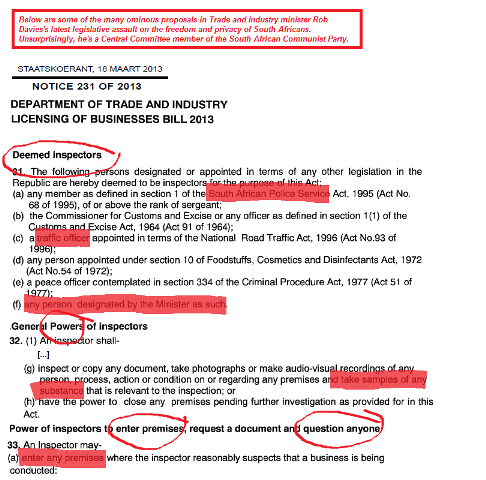Licensing of Businesses Bill undermines economic freedom, wealth creation and privacy - Solidarity
Trade union Solidarity today proposed that the Licensing of Businesses Bill, 2013, be scrapped, since it has contradictory aims, will be to the detriment of employers, employees and consumers and paves the way for grave privacy violations and abuses of state power (see here - PDF). The bill is not only an embarrassment for the government and the Department of Trade and Industry, but also diverts valuable resources away from economic development and towards preventing the bill's imminent economic harm.
According to Piet le Roux, senior researcher at the Solidarity Research Institute, the bill is contradictory right from the outset. ‘The first purpose of the bill is to "promote the right to freedom of trade, occupation and profession and any rights contained in the Constitution." The second purpose stated in the bill, "to promote the development of South African economy (sic) by providing a standardised regulatory framework within which business licensing would take place", already contradicts the first.' Le Roux continues: ‘The true purpose of the bill is not to promote the right to freedom of trade, occupation and profession, but to circumscribe it, to limit it, to make it subject to burdensome, arbitrary regulations.'
Le Roux says that even a cursory study of the bill reveals numerous language errors and incomplete sentences, as well as impractical definitions. For example, the bill's definition of "sell" is broad enough to cover virtually any human interaction and licensing inspectors will consequently have extravagant powers. ‘After having defined "sell" so vaguely, the bill provides for the right of inspectors such as members of the South African Police Service and traffic officers to enter, without a warrant, any premises they suspect of being a site for business activity, question anybody, take samples of any substance and have the power to close any premises pending further investigation. This - and the general regulatory burden of the bill - bodes ill for employers and employees who will have to deal with this additional obstruction to economic freedom and success,' says Le Roux.
‘The bill attests to an obsession with control. Instead of proposing that some or other harmful activity be prohibited, the bill turns it around and suggests that any business activity should first have state sanction before it can be conducted. No longer is any business activity, as long as it isn't fraudulent or otherwise forbidden, acceptable. Under this new bill no business activity is acceptable unless it is licensed,' adds Le Roux.
Statement issued by Piet le Roux, Senior economics researcher: SRI, April 17 2013

Click here to sign up to receive our free daily headline email newsletter

